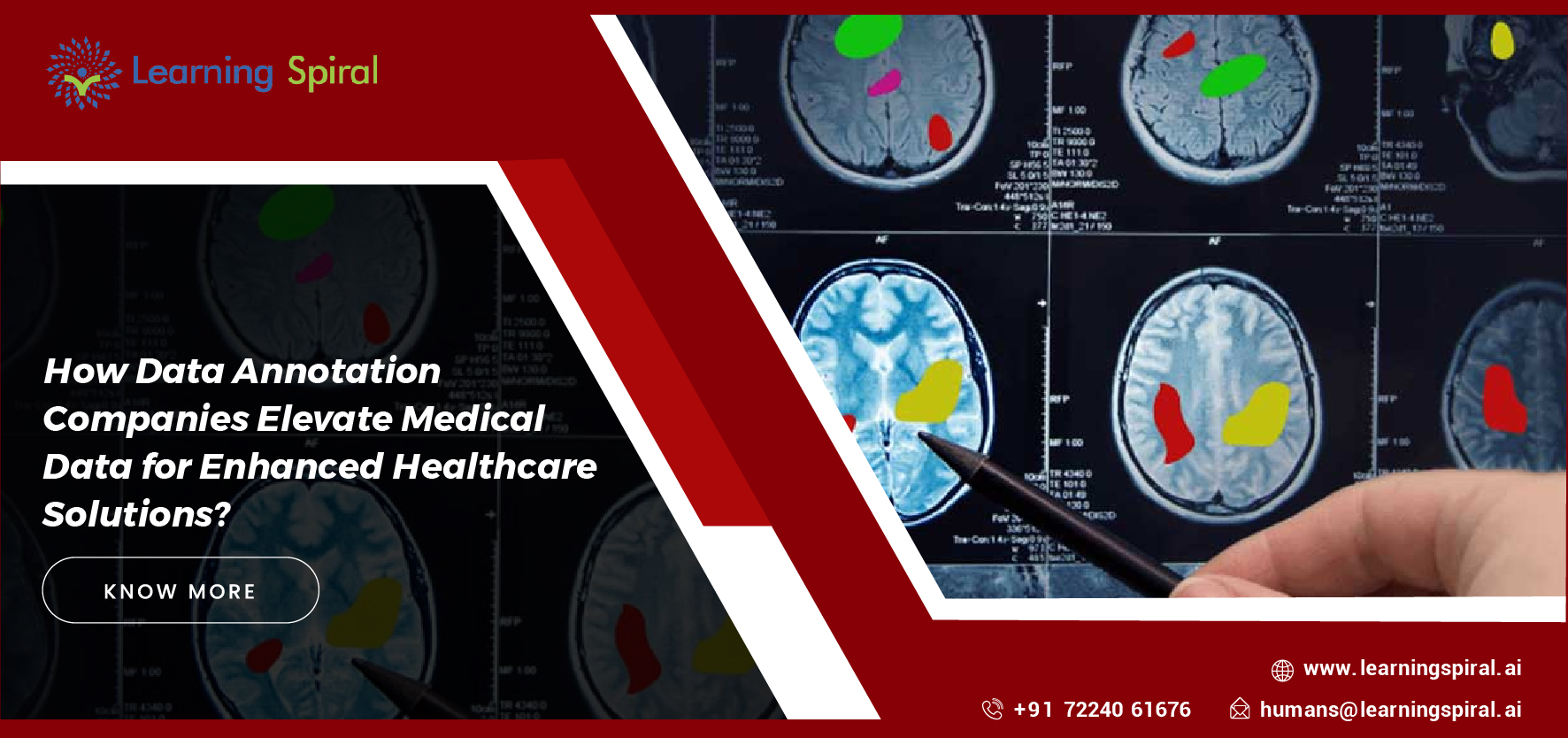
- October 9, 2024
- Manish Mohta
- 0
In today’s healthcare landscape, data has become one of the most valuable assets. From patient records to diagnostic images, an overwhelming amount of medical information is generated every day. However, for this data to make a meaningful impact, especially in the context of AI-driven healthcare solutions, it must first be properly labeled and interpreted. This is where data annotation becomes essential. Companies like Learning Spiral AI play a pivotal role in ensuring that medical data is accurately annotated, enabling AI to assist healthcare professionals in delivering better outcomes.
The Role of Data Annotation in Healthcare 
Medical data annotation is the process of labeling or tagging medical data, such as images, text, and audio files, to train AI models for specific tasks. In healthcare, data annotation is especially crucial because even the smallest error in labeling can lead to significant issues in diagnosis, treatment, or patient care.
Take, for example, MRI scans used to detect tumors. Without properly annotated data, AI models cannot be trained to identify the presence, size, or location of these tumors with precision. Similarly, in the case of predictive analytics, AI models need properly labeled patient records to predict future outcomes, such as the likelihood of disease progression or treatment success.
At Learning Spiral AI, we specialize in medical data annotation, combining human expertise with cutting-edge AI tools to deliver accurate, high-quality annotations. Our team is experienced in working with a variety of healthcare data formats, including diagnostic images, electronic health records (EHRs), and even audio recordings of patient consultations. Our work ensures that the data used to train AI models is accurate, which in turn allows for better healthcare outcomes.
Applications of Medical Data Annotation
Medical data annotation has broad applications across various sectors within healthcare. Some of the most significant areas include:
- Diagnostic Imaging: Annotating images such as MRIs, X-rays, CT scans, and ultrasounds to train AI models to detect diseases like cancer, cardiovascular conditions, or neurological disorders. AI can then assist radiologists by flagging potential areas of concern that need further review.
- Electronic Health Records (EHRs): Annotating patient records to help AI identify patterns or trends that may suggest treatment recommendations, potential health risks, or other critical insights. This helps doctors provide personalized care plans based on historical patient data.
- Predictive Analytics: Annotating datasets for predictive models that can forecast patient outcomes, disease progression, or the efficacy of a specific treatment. This supports preventive healthcare by allowing earlier intervention in high-risk cases.
- Treatment Recommendations: AI models trained on annotated medical data can offer suggestions for personalized treatment plans, considering factors such as the patient’s medical history, existing conditions, and response to previous treatments.
Improved Healthcare Solutions with Learning Spiral AI
Properly annotated medical data empowers AI to achieve several critical healthcare goals:
- Early Disease Detection: AI models trained on accurately annotated medical images and patient data can detect diseases at an earlier stage, leading to quicker intervention and better outcomes.
- Enhanced Treatment Recommendations: Annotated data allows AI to generate personalized treatment recommendations based on patterns in historical patient data, offering doctors a valuable decision-making tool.
- Predictive Patient Outcomes: AI can predict patient outcomes, such as the likelihood of disease progression or recovery, which can guide healthcare providers in making more informed treatment decisions.
- Improved Preventive Care: With the help of annotated data, AI models can analyze patient trends to recommend preventive measures, potentially reducing the need for more intensive treatments later on.
Why Choose Learning Spiral AI?
At Learning Spiral AI, we understand the importance of accuracy and security in handling medical data. Our team of skilled annotators works closely with medical professionals to ensure that every label, tag, or classification is meaningful and contributes to the end goal of improving patient care. We also prioritize compliance with all relevant regulations, including strict data security protocols, to ensure the confidentiality of sensitive medical information.
What sets Learning Spiral AI apart is our blend of human expertise and AI-driven tools, which allows us to deliver annotation services with unparalleled precision. We collaborate closely with our clients, customizing our approach to meet the specific needs of each healthcare organization. Whether it’s annotating medical images for disease detection or patient records for predictive analytics, we make sure that the data is ready for AI to deliver valuable insights.
By choosing Learning Spiral AI for your medical data annotation needs, healthcare providers can trust that their data is in safe hands and that the insights generated by AI will be both accurate and actionable. With our meticulous approach to annotation, we help healthcare organizations unlock the true potential of AI, leading to more efficient, accurate, and faster healthcare delivery.
In summary, medical data annotation is essential for transforming raw healthcare data into actionable insights. At Learning Spiral AI, we ensure that this data is meticulously labeled, empowering AI to drive innovations that ultimately improve patient outcomes and streamline healthcare processes.

